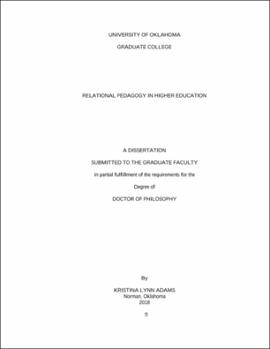| dc.contributor.advisor | Beach, Sara | |
| dc.contributor.author | Adams, Kristina | |
| dc.date.accessioned | 2018-05-22T15:21:58Z | |
| dc.date.available | 2018-05-22T15:21:58Z | |
| dc.date.issued | 2018 | |
| dc.identifier.uri | https://hdl.handle.net/11244/299945 | |
| dc.description.abstract | The purpose of this study was to understand how caring teachers enact relational pedagogy in higher education. In this study, relational pedagogy was defined as the intentional practice of caring teachers interacting with students to build and sustain positive relationships that cognitively and emotionally support their students throughout their journeys together. This study contributes to existing literature by: answering requests from scholars to include observational data of higher education classrooms, extending relational pedagogy from theoretical discourse to practical application, and introducing relational intention as a necessary concept to the enactment of relational pedagogy. The current study provides an opportunity for institutions to address issues of persistence, retention, remediation, and changing demographics in higher education at the classroom level where teaching and learning occur, and where relationships between teachers and students are built. The research design followed a constructivist grounded theory qualitative approach with eight caring teachers in a community college setting. The site of the study was a suburban community college located in the Midwest with large non-traditional student enrollment. The study took place during an eight week summer session. Recruitment of the purposeful sample began by contacting division deans at a Midwestern Community College (pseudonym). The division deans were informed of the research purpose and the characteristics of caring teachers. Each division dean nominated caring teachers from his or her division who were teaching during the summer semester and who might be willing to participate in the study. Out of the fifteen nominated teachers, eight teachers who were identified as caring teachers agreed to participate in the study. Five teachers taught in the mathematics and sciences division, one teacher taught in the health professions division, and two teachers taught in the humanities division. The data sources were teacher interviews and classroom observations. Each teacher had one formal interview and four classroom observations with follow-up interviews between observations. The findings of this study indicated that a caring teacher was necessary but insufficient; relational intention was found to be necessary for the enactment of relational pedagogy. Relational intention varied, which indicated enactment was on a continuum based on the teacher’s purpose and how each teacher devoted time to get to know their students. The major implications of this study involve suggestions for institutions of higher education such as: providing support of faculty on how to relationally charge their practice, developing learning communities, and re-thinking the Carnegie unit. In addition, this study has implications for faculty who work with pre-service teachers such as: modeling relational pedagogy during education coursework and providing opportunities for focused observations of classrooms where relational pedagogy is enacted. | en_US |
| dc.language | en_US | en_US |
| dc.subject | Relational Pedagogy | en_US |
| dc.subject | Relational Intention | en_US |
| dc.subject | Higher Education | en_US |
| dc.subject | Teacher - Student Relationships | en_US |
| dc.title | Relational Pedagogy in Higher Education | en_US |
| dc.contributor.committeeMember | Barker, Peter | |
| dc.contributor.committeeMember | Houser, Neil | |
| dc.contributor.committeeMember | Laubach, Timothy | |
| dc.contributor.committeeMember | Reeder, Stacy | |
| dc.date.manuscript | 2018-05 | |
| dc.thesis.degree | Ph.D. | en_US |
| ou.group | Jeannine Rainbolt College of Education::Department of Instructional Leadership and Academic Curriculum | en_US |
